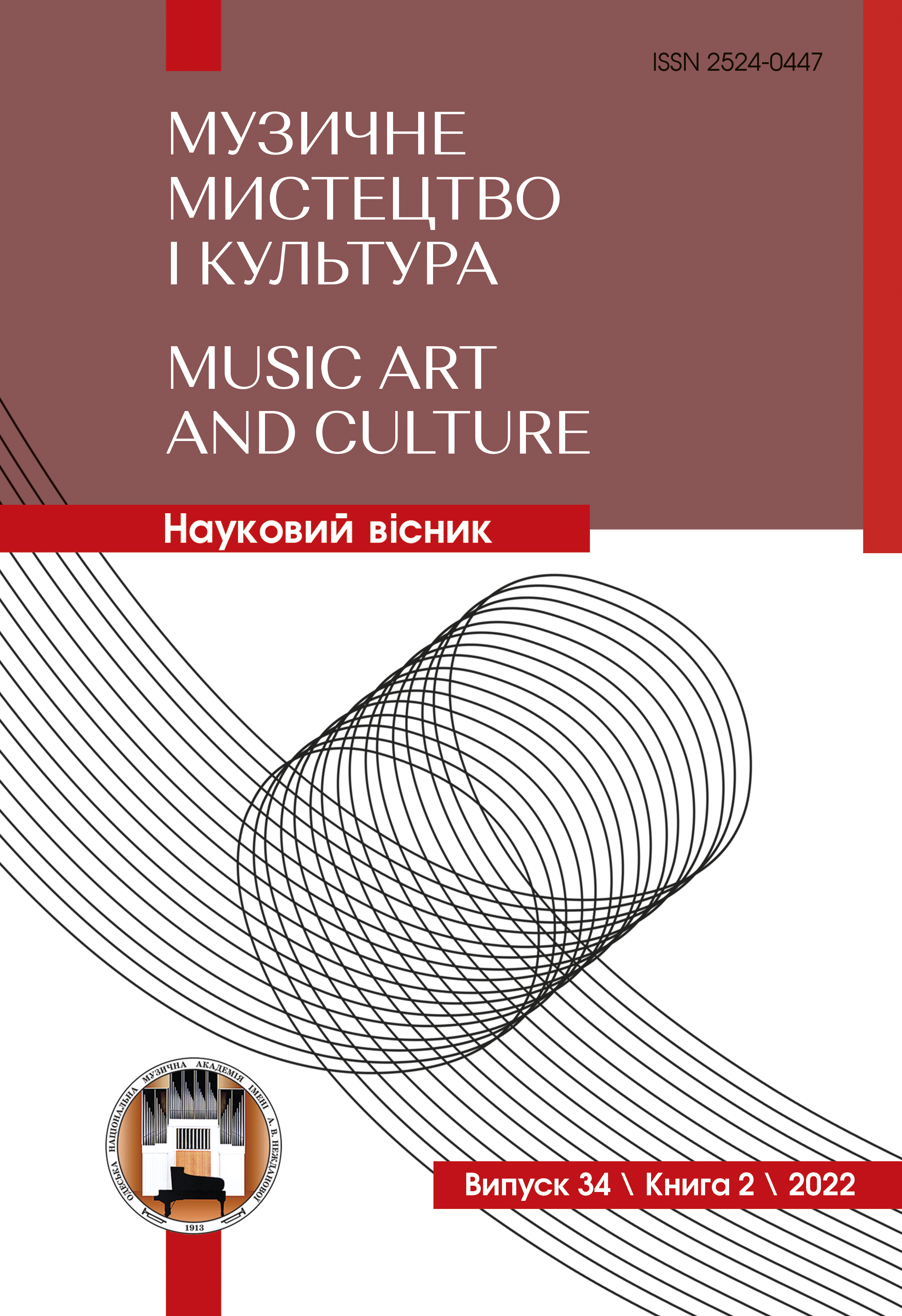ФЕНОМЕНОЛОГІЧНІ ОСОБЛИВОСТІ МУЗИЧНОГО ЗВУКУ В КОНТЕКСТІ ОРГАНОЛОГІЧНОГО ПІДХОДУ
Анотація
Мета роботи – дослідження особливостей музичного звуку в контексті органологічного підходу. Методологія дослідження спирається на історико-типологічний, феноменологічний, психологічний та компаративний методи. Наукова новизна – у дослідженні особливостей музичного звуку як феноменологічного явища та «поєднуючої ланки» з боку «внутрішніх» (психологічних та психо-фізіологічних) та «зовнішніх» (широкого контексту) факторів; особливого значення набуває застосування психологічного та органологічного підходів, що поглиблює розуміння особливості звуковидобування та інтонування в клавірних творах барокової епохи. Висновки. Складність та багатоаспектність проблеми музичного звуку як феномену викликає необхідність постійного пошуку шляхів для її вирішення та оновлення методів; розширення контексту та залучення психологічних підходів, які пов’язані безпосередньо з процесом звуковидобування і музичного мислення. Звуковий «ідеал», його сприйняття та критерії постійно змінюються, як змінюються музичні (клавішні) інструменти, епохи і композиторські стилі, що обумовлює при інтерпретації музичного твору, особливо барокової епохи, необхідність врахування і специфіки аутентичних інструментів, й особливості засобів виразності, підходячи до поняття артикуляція з широких позицій. Все більш активне залучення електронних клавішних музичних інструментів (як в музичних закладах, так і в домашньому музикуванні) вносить серйозні ускладнення не тільки у процес звуковидобування та інтонування, але й у формування професійних навичок піаніста в цілому. Єдиним орієнтиром для слухової сфери музиканта-виконавця залишається постійне звернення та аналіз природи і особливості інтонування та артикуляції видатними світовими музикантами-виконавцями – золотого фонду світової виконавської культури.
Посилання
2. Кашкадамова Н. Виконавська інтерпретація у фортепіанному мистецтві ХХ сторіччя: Підручник. Львів: КІНПАТРІ ЛТД, 2014. 344 с.
3. Курт Е. Тонпсихология и музыкальная психология. Психология музыки и музыкальных способностей. / Сост.-ред. А.Е. Тарас. М.: АСТ; Мн.: Харвест, 2005. С. 618–698.
4. Рябуха Н.О. Трансформація звукового образу світу у фортепіанній культурі: онто-сонологічний підхід : автореф. дис. на здобуття наук. ступ. д-ра мист. : 26.00.01. Харків, 2017. 39 с.
5. Шабалтина С. Клавесин сквозь века. Заметки исполнителя. Киев: Український пріоритет, 2013. 160 с.
6. Kurt E. Romantische Harmonik und ihre Krise in Wagner «Tristan». Max Hesses Verlag Berlin. 1923, 551 p.
7. Schumann R. Kreisleriana (for Piano), op. 16. 32 p. URL: h t t p s : / / l i b r a r y . m u s i c a n e o . c o m / r u / s h e e t m u s i c / p u r c h a s e /
s m - 4 3 5 4 _ k r e j s l e r i a n a _ d l y a _ f o r t e p i a n o _ o p _ 1 6 . h t m l ? k e y = o X _
EQysiWTXfoc8LnrgUuF_sRZQt-lUr#4354 (дата звернення 12.09.23).




 Музичне мистецтво і культура
Музичне мистецтво і культура